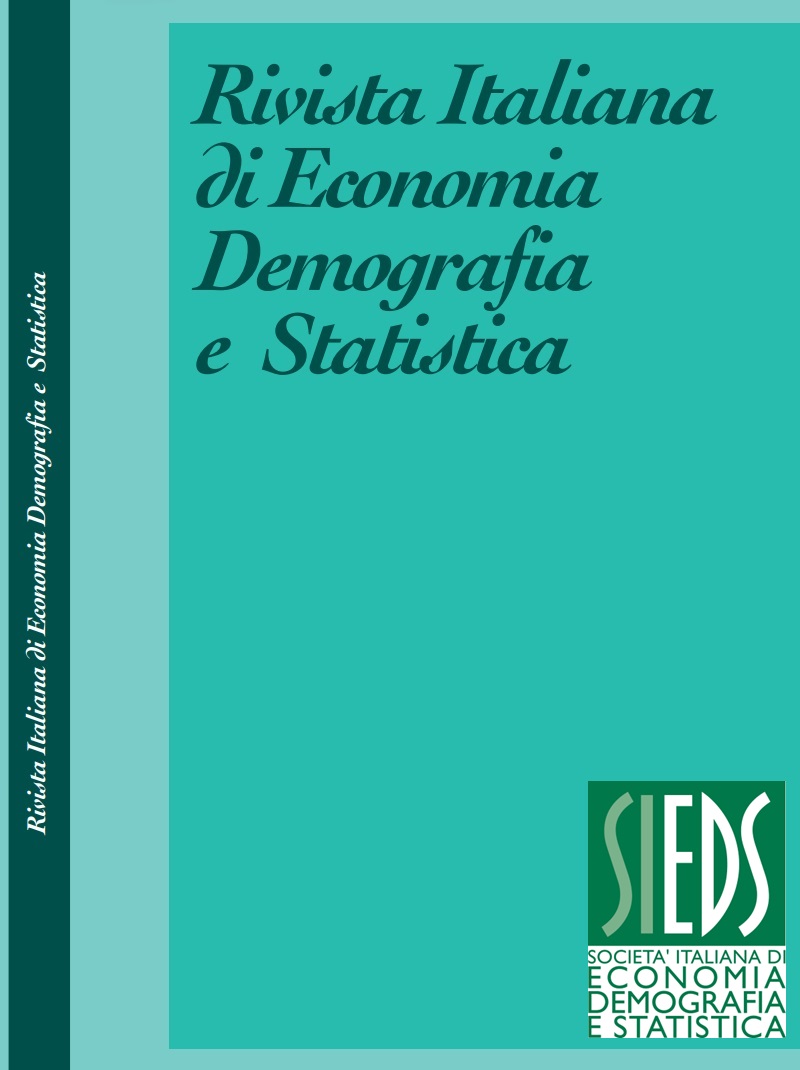Environmental concern: a culture of trust
DOI:
https://doi.org/10.71014/sieds.v79i2.293Abstract
In this paper, we test the hypothesis that participation in cultural associations improves social capital, and more specifically generalized trust, which in turn fosters environmental concern. Using a dataset combining two large cross-national socioeconomic surveys and an instrumental variable mediation approach, we find that a measure of generalized trust fully mediates the relationship between people’s participation in cultural organizations and their environmental concerns. This result suggests that governments can increase citizens' environmental concern – a prerequisite for pro-environmental behaviors – by encouraging their participation in cultural associations.
References
AGOVINO M., CROCIATA A., QUAGLIONE D., SACCO P., SARRA A. 2017. Good taste tastes good. Cultural capital as a determinant of organic food purchase by Italian consumers: Evidence and policy implications. Ecological Economics, 141, 66-75. DOI: https://doi.org/10.1016/j.ecolecon.2017.05.029
ALDY J. E., KOTCHEN M. J., LEISEROWITZ A. A. 2012. Willingness to pay and political support for a US national clean energy standard. Nature Climate Change, Vol. 2, No.8, pp. 596-599. DOI: https://doi.org/10.1038/nclimate1527
BAC M. 2009. Generalized trust and wealth. International Review of Law and Economics, Vol. 29, No.1, pp. 46-56. DOI: https://doi.org/10.1016/j.irle.2008.07.008
BAMBERG, S. 2003. How does environmental concern influence specific environmentally related behaviors? A new answer to an old question. Journal of environmental psychology, Vol. 23, No. 1, pp. 21-32. DOI: https://doi.org/10.1016/S0272-4944(02)00078-6
BARON R. M., KENNY, D. A. 1986. The moderator–mediator variable distinction in social psychological research: Conceptual, strategic, and statistical considerations. Journal of personality and social psychology, Vol. 51, No. 6, pp. 1173-1182. DOI: https://doi.org/10.1037//0022-3514.51.6.1173
BORRA C., SEVILLA A. 2019. Competition for university places and parental time investments: Evidence from the United Kingdom. Economic Inquiry, Vol. 57, No. 3, pp. 1460-1479. DOI: https://doi.org/10.1111/ecin.12761
CAMPAGNA D., CAPERNA G., MONTALTO V. 2020. Does culture make a better citizen? Exploring the relationship between cultural and civic participation in Italy. Social Indicators Research, Vol. 149, No. 2, pp. 657-686. DOI: https://doi.org/10.1007/s11205-020-02265-3
CLARK C. F., KOTCHEN M. J., MOORE M. R. 2003. Internal and external influences on pro-environmental behavior: Participation in a green electricity program. Journal of environmental psychology, Vol. 23, No. 3, pp. 237-246. DOI: https://doi.org/10.1016/S0272-4944(02)00105-6
CONLEY T. G., HANSEN C. B., ROSSI P. E. 2012. Plausibly Exogenous. The Review of Economics and Statistics, Vol. 94, No. 1, pp. 260-272. DOI: https://doi.org/10.1162/REST_a_00139
CROCIATA A., AGOVINO M., SACCO P. L. 2015. Recycling waste: Does culture matter?. Journal of Behavioral and Experimental Economics, 55, pp. 40-47. DOI: https://doi.org/10.1016/j.socec.2015.01.005
D’HAULTFŒUILLE X., HODERLEIN S., SASAKI Y. 2021. Testing and relaxing the exclusion restriction in the control function approach. Journal of Econometrics, Vol. 24, No. 2.
DIPPEL C., FERRARA A., HEBLICH S. 2020. Causal mediation analysis in instrumental-variables regressions. The Stata Journal, Vol. 20, No.3, pp. 613-626. DOI: https://doi.org/10.1177/1536867X20953572
DOEPKE M., ZILIBOTTI M. 2017. Parenting with Style: Altruism and Paternalism in Intergenerational Preference Transmission. Econometrica, Vol. 85, No. 5, pp. 1331–1371. DOI: https://doi.org/10.3982/ECTA14634
DURLAUF S. N. 2002. On the empirics of social capital. The Economic Journal, Vol. 112, No. 483, pp. 459-479. DOI: https://doi.org/10.1111/1468-0297.00079
EMIRU T. S., WAKTOLA D. K. 2018. The environmental awareness of higher education students and the implications for the Paris Climate Agreement: empirical evidences from Ethiopia and USA. International Research in Geographical and Environmental Education, Vol. 27, No. 3, pp. 216-233. DOI: https://doi.org/10.1080/10382046.2017.1349375
EVS/WVS (2024). Joint EVS/WVS 2017-2022 Dataset (Joint EVS/WVS). GESIS, Cologne. ZA7505 Data file Version 5.0.0, https://doi.org/10.4232/1.14320.
HUTTER M., 1996. The impact of cultural economics on economic theory. Journal of Cultural Economics, 20, pp. 263–268. DOI: https://doi.org/10.1007/s10824-005-3268-3
LAREAU A. 2003. Unequal Childhoods. Berkeley: University of California Press.
MACIAS T., WILLIAMS K. 2016. Know your neighbors, save the planet: Social capital and the widening wedge of pro-environmental outcomes. Environment and Behavior, Vol. 48, No. 3, pp. 391-420. DOI: https://doi.org/10.1177/0013916514540458
PUTNAM R. D. 1995. Tuning in, tuning out: The strange disappearance of social capital in America. PS: Political science & politics, Vol. 28, No. 4, pp. 664-683. DOI: https://doi.org/10.2307/420517
QUAGLIONE D., CASSETTA E., CROCIATA A., SARRA A. 2017. Exploring additional determinants of energy-saving behaviour: The influence of individuals' participation in cultural activities. Energy Policy, 108, pp. 503-511. DOI: https://doi.org/10.1016/j.enpol.2017.06.030
SACCO P.L, FERILLI G., TAVANO BLESSI G. 2012. Culture 3.0: A new perspective for the EU active citizenship and social and economic cohesion policy. In: EUROPEAN HOUSE FOR CULTURE (Ed.) The cultural component of citizenship: An inventory of challenge, Access to the culture platform pp.195–213.
SAMEJIMA, F. (1969). Estimation of latent ability using a response pattern of graded scores. Psychometrika monograph supplement, Vol. 34, No. 4, Pt. 2, 100. DOI: https://doi.org/10.1007/BF03372160
STOLLE D., ROCHON T. R. 1998. Are all associations alike? Member diversity, associational type, and the creation of social capital. American Behavioral Scientist, Vol. 42, No.1, pp. 47-65. DOI: https://doi.org/10.1177/0002764298042001005
UNESCO 2001. UNESCO Universal Declaration on Cultural Diversity. Paris: UNESCO.
WHEELER S. 2018. ‘Essential assistance’ versus ‘concerted cultivation’: theorising class-based patterns of parenting in Britain. Pedagogy, Culture & Society, 26.3, pp. 327-344. DOI: https://doi.org/10.1080/14681366.2017.1401551
WOOLDRIDGE J. M. 2010. Econometric analysis of cross section and panel data. The MIT press.
WRIGHT S. D., CASERTA M., LUND D. A. 2003. Older adults' attitudes, concerns, and support for environmental issues in the “new West”. The International Journal of Aging and Human Development, Vol. 57, No. 2, pp. 151-179. DOI: https://doi.org/10.2190/Y73Y-0RK9-RP0J-E7HH
ZELEZNY L. C., CHUA P. P., ALDRICH C. 2000. Elaborating on gender differences in environmentalism. Journal of Social issues, Vol. 56, No. 3, pp. 443-458. DOI: https://doi.org/10.1111/0022-4537.00177
Downloads
Published
Issue
Section
License
Copyright (c) 2025 Thomas Bassetti, Filippo Pavesi, Massimo Scotti

This work is licensed under a Creative Commons Attribution 4.0 International License.



